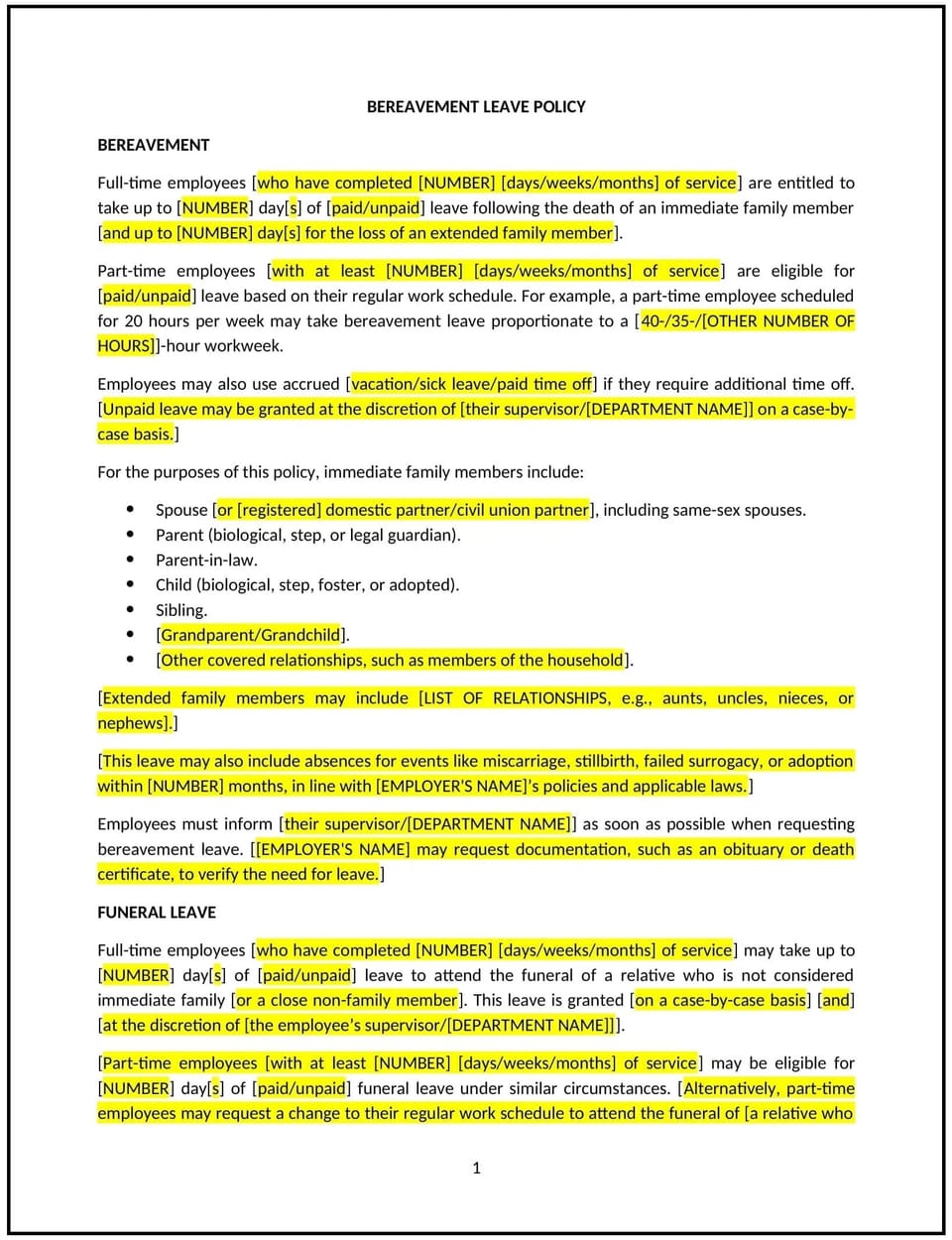Bereavement leave policy (Vermont): Free template

Bereavement leave policy (Vermont)
This bereavement leave policy is designed to help Vermont businesses provide employees with time off to grieve and manage personal matters following the loss of a loved one. It outlines eligibility, leave duration, and procedures for requesting time off while maintaining sensitivity to employees’ needs.
By adopting this policy, businesses can support employee well-being and foster a compassionate workplace culture.
How to use this bereavement leave policy (Vermont)
- Define eligibility: Specify which employees qualify for bereavement leave, such as full-time, part-time, or temporary employees.
- Include covered relationships: Outline the relationships covered under this policy, such as immediate family members (e.g., spouse, parent, child, or sibling) or extended relatives.
- Establish leave duration: Specify the number of paid or unpaid days available for bereavement leave and any extensions allowed based on circumstances.
- Address additional time off: Provide options for employees to use accrued paid time off (PTO) or unpaid leave if more time is needed.
- Clarify request procedures: Require employees to notify HR or their supervisor as soon as possible and provide basic information about the leave request.
- Emphasize confidentiality: Assure employees that their privacy will be respected, and personal information will remain confidential.
- Monitor compliance: Regularly review leave practices to ensure alignment with Vermont employment laws and company policies.
Benefits of using this bereavement leave policy (Vermont)
This policy provides several benefits for Vermont businesses:
- Supports employee well-being: Offers employees time to grieve and manage personal matters during difficult times.
- Promotes compassion: Demonstrates the company’s commitment to a supportive workplace culture.
- Enhances compliance: Aligns with Vermont laws regarding employee leave and workplace rights.
- Encourages transparency: Provides employees with clear guidelines for requesting and managing bereavement leave.
- Reduces workplace disruptions: Ensures a structured approach to handling employee absences during bereavement.
Tips for using this bereavement leave policy (Vermont)
- Communicate the policy: Share the policy with employees during onboarding and include it in the employee handbook.
- Train managers: Educate supervisors on handling bereavement leave requests with sensitivity and discretion.
- Be flexible: Consider accommodating additional time off when employees face exceptional circumstances or complex personal needs.
- Maintain records: Keep documentation of bereavement leave requests and approvals for consistency and compliance.
- Update regularly: Revise the policy to reflect changes in Vermont laws, workplace needs, or best practices.
Q: Who is eligible for bereavement leave under this policy?
A: Eligibility is extended to all employees, including full-time, part-time, and temporary workers, depending on company policy.
Q: What relationships qualify for bereavement leave?
A: Covered relationships typically include immediate family members such as a spouse, parent, child, sibling, or other relatives as defined in the policy.
Q: How many days of bereavement leave are provided?
A: The policy provides [insert number] days of paid or unpaid leave, with options to extend using accrued PTO or unpaid leave.
Q: How should employees request bereavement leave?
A: Employees should notify HR or their supervisor as soon as possible, providing basic details about the leave request.
Q: Can additional time off be granted?
A: Yes, employees may request additional time off using accrued PTO or unpaid leave if more time is needed.
Q: Is bereavement leave paid or unpaid?
A: Bereavement leave may be paid, unpaid, or a combination of both, depending on the company’s policy.
Q: How often is this policy reviewed?
A: This policy is reviewed annually or whenever significant changes occur in Vermont laws or workplace practices.
Q: Does this policy apply to extended family or non-family members?
A: The policy may cover extended family or non-family members at the company’s discretion, as outlined in the policy.
This article contains general legal information and does not contain legal advice. Cobrief is not a law firm or a substitute for an attorney or law firm. The law is complex and changes often. For legal advice, please ask a lawyer.


